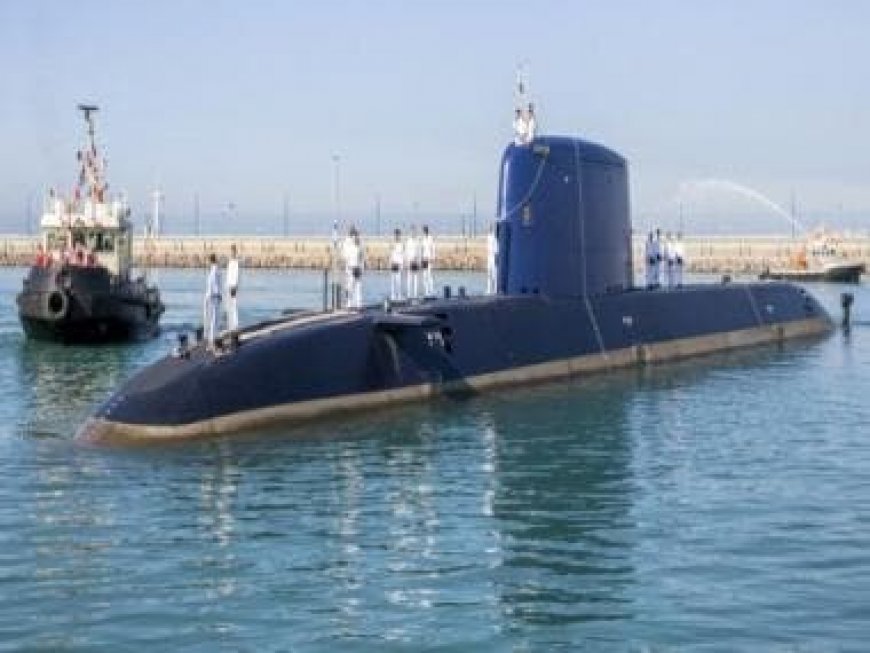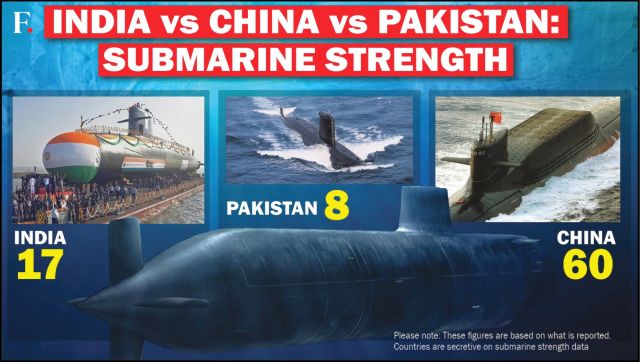Germany, India near deal for 6 submarines: Why this is significant for New Delhi
Germany, India near deal for 6 submarines: Why this is significant for New Delhi

Germany is in a “good place” in the race to build six submarines for India, said the European giant’s Defence Minister Boris Pistorius after he held long-ranging talks with India’s Rajnath Singh during his four-day visit to the country.
Pistorius, who is the first German defence minister to visit India since 2015, has a busy schedule in the country – he held talks with Rajnath Singh on Tuesday and today (7 June) he will travel to Mumbai and visit the Mazagon Dock Shipbuilders.
After his talks with Singh, Pistorius also told reporters that Berlin’s strategic ties with New Delhi have become more important in the context of the unpredictable situation in the Indo-Pacific. He also indicated Germany’s approach to intensify defence ties with India while noting Europe’s reluctance to deliver weapons to India that he said made New Delhi look towards Russia.
But what exactly is this submarine deal? And more importantly why is it a big deal for India?
We take a deep dive and give you the answers.
Six German subs in Rs 43,000 crore deal
Germany’s ThyssenKrupp Marine Systems (TKMS) is looking to bag a contract to build six submarines for India in a Rs 43,000 crore deal. The submarines will be built through a strategic partnership (SP) mode, under the Project called P-75 India.
Speaking on the same, Pistorius said, “We are talking about a deal of TKMS… about six submarines but of course the procedure is not finished yet but I think the German industry is at a good place in that race.”
Also read: Why Germany should pursue defence ties with India independent of anti-Russia alliance
“We support the ‘Make in India’ principle favoured by India. We think that’s right,” the German defence minister said.

For the unaware, the P-75 India, or P-75I project, envisages the construction of six conventional submarines with better sensors and weapons and the Air Independent Propulsion System (AIP). Under the strategic partnership model, an Indian shipyard will be selected by the government, which will also nominate the foreign original equipment manufacturer (OEM) under the overall arch of ‘Make in India’.
Germany has become the frontrunner for the submarine deal after France’s defence company Naval Group announced in May 2022 that it would not be able to join the P-75I project. Announcing their withdrawal, Laurent Videau, country and managing director, Naval Group India, had said: “The present request for proposal (RFP) requires that the fuel cell AIP (air-independent propulsion) be sea proven, which is not the case for us yet since the French Navy does not use such propulsion system.”
India is insistent on the AIP technology, as it allows a conventional submarine to remain submerged for much longer than ordinary diesel-electric submarines. It is said that AIP permits a submarine to remain under water for more than a fortnight, compared to two-three days for diesel-powered boats.
Following France’s withdrawal, Germany and South Korea’s Daewoo Shipbuilding & Marine Engineering Company have been in the fray, but the Korean submarine pitched is reportedly based on a German design.
The P-75I project has been in choppy waters ever since the Nirmala Sitharaman-headed Defence Acquisition Council cleared the much-awaited project under which six submarines were to be built.
As per the original plan, Indian shipyards had to submit a consolidated bid with a foreign collaborator in 2021. After a series of issues were raised regarding liability clauses and other difficulties, the deadline was extended to June 2022. This was further extended to December 2022 and again extended to August this year.
According to experts, even if all goes smoothly and Germany bags the contract, the earliest the first P-75I submarine can be commissioned is around 2032.

Significance of this deal
If Germany bags the contract, it will come as a big boost to India’s naval strength. Currently, India has 17 conventional diesel-electric submarines, which are classified as SSKs. The last submarine to be commissioned by India was the INS Vagir in January this year. INS Vagsheer, the sixth such submarine, is expected to be inducted next year.
According to Indian Express, India also has two nuclear ballistic submarines.
Of the 17 SSKs, four are of Shishumar Class, which were bought and then built in India in collaboration with the Germans starting 1980s; seven are Kilo Class or Sindhughosh Class submarines bought from Russia (including erstwhile USSR) between 1984 and 2000; and six are Kalvari Class built in India at Mazagon Dock Shipbuilders Limited.
Compare this to India’s neighbours – China and Pakistan. The Asian Dragon has 60 submarines in its arsenal whereas Islamabad has eight diesel-electric submarines.
Experts note that this number is less than the number of submarines that is required to ensure our waters are safe and also protect it from a more aggressive and expansionist China. Commodore (retired) Anil Jai Singh, who commanded four submarines, served in the Directorates of Naval Plans and Submarine Acquisition at Naval Headquarters, and was involved in drafting the Navy’s 30-year submarine construction plan, was quoted as telling Indian Express earlier, “First, we need it for our own maritime security. Second, Chinese are going to be positioning a lot more ships and submarines in the Indian Ocean in the coming years.”
Benefits to Germany
If Berlin and New Delhi ink this submarine deal, India is not the only winner. Germany has been pushing efforts to supply New Delhi with modern military gear. This is interesting considering the Kiel-based defence manufacturing giant had shown no interest in jointly manufacturing submarines in India when the tender was announced two years ago.
Experts note that Germany’s push to boost defence ties with India comes owing to the Ukraine war and also China’s continued aggression.
With the deal, Berlin hopes to wean off New Delhi’s dependence on Russia in the defence sector. India’s Armed Forces have long relied heavily on Russia for arms and military equipment – in 2022, according to the Stimson Center, 70 per cent to 85 per cent of India’s military platforms are of Russian origin.
Speaking on the same, German defence minister Boris Pistorius said it was not in Berlin’s interest for India to remain dependent on Russian weapons.
Talking about the situation in the Indo-Pacific, Pistorius was quoted as telling the media, “I think we should, and we can and we ought to do more in that region (Indo-Pacific) in partnership with India. Because we are approaching times we can’t really predict what’s going to happen in the next few years.”
“And we need strategic partners like Indonesia, like India, for example, to make sure that the Law of Free navigation, and the free trading routes will be achievable during the next decade too,” he said.
With inputs from agencies
Read all the Latest News, Trending News, Cricket News, Bollywood News,
India News and Entertainment News here. Follow us on Facebook, Twitter and Instagram.
What's Your Reaction?



























































